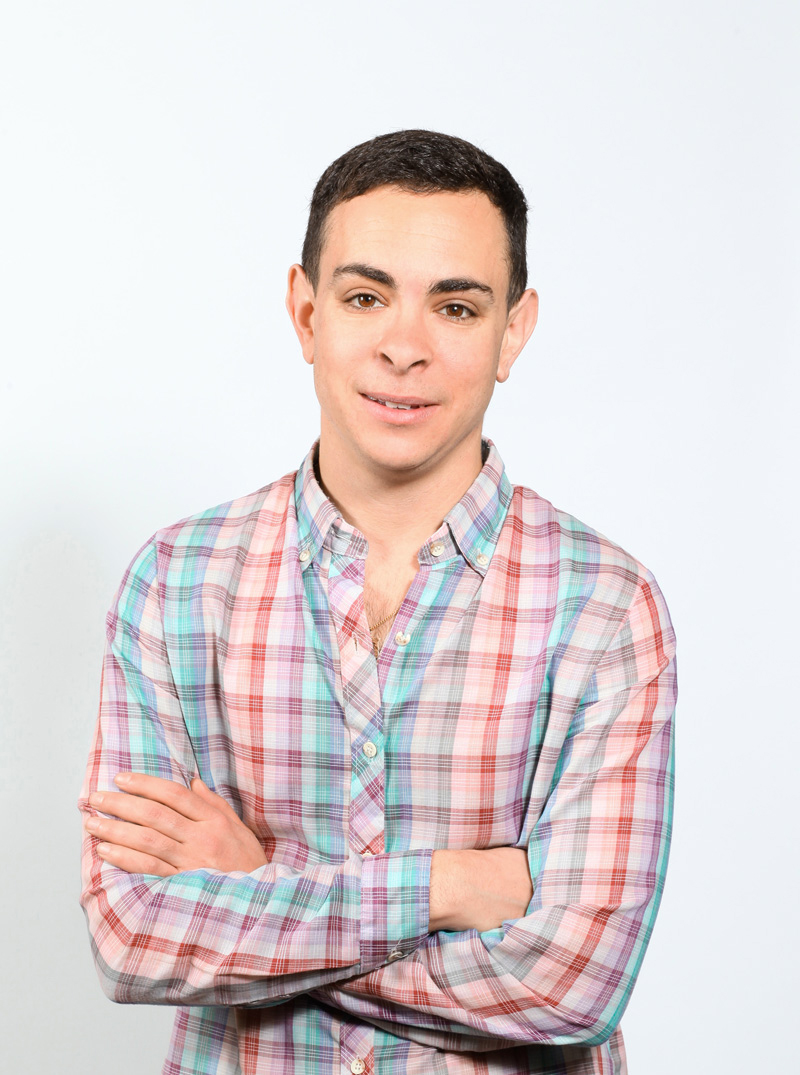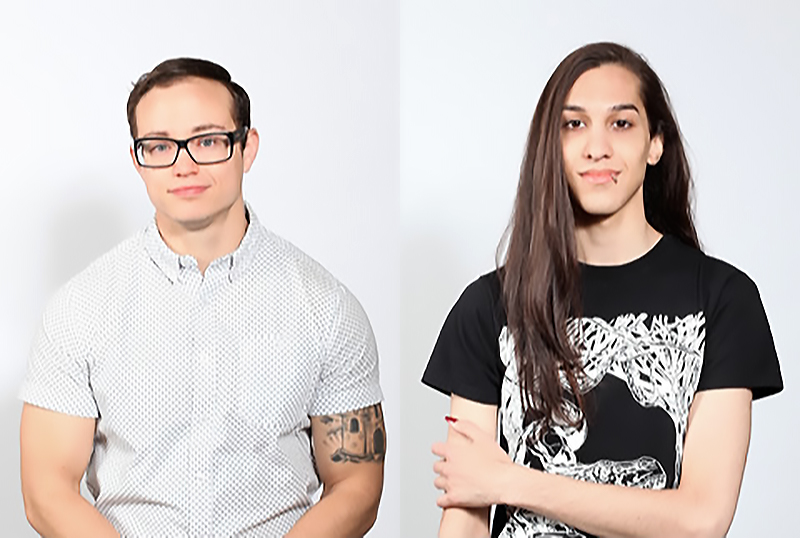As a first-year student at Victoria College, Cassandra Williams never considered getting involved in campus politics. She concentrated on her studies in philosophy and cognitive science, and, in her spare time, hung out with friends in Toronto’s punk music scene.
But then Williams came across some people on Facebook who were harassing LGBTQ and foreign-born students, and she wanted to do something to counteract the “jerks.” So, in second year, she and a few friends created their own Facebook page – an explicitly inclusive and welcoming place where first-year students could find out from their upper-year classmates what was going on, meet other students and get information to ease what can be a stressful transition from high school to university.
For several months, Williams started her days by answering questions from anxious new students, primarily about how to navigate administrative complexities such as changing courses and getting financial aid. The page was well received and the U of T Students’ Union (UTSU) endorsed it. “I was convinced that I have a perspective that most people don’t because of the way I’ve interacted with students,” she says. Friends began pressing her to run for student government.
Earlier this year, she did exactly that. And in March, Williams was elected to the position of vice-president, university affairs. Her success marked the first time an out trans person had ever been elected to the UTSU executive. Her peers on the “Hello U of T” slate were “completely fine” with the fact that she had recently come out as trans, she says, and no one thought to make her historic campaign an issue, either celebratory or otherwise. “We’re a diverse group of students,” she says of her running mates. “It kind of flew under the radar.”
Williams is one of a growing number of U of T students who are identifying as trans – whose gender identity doesn’t match the gender they were assigned at birth. Some may seek sex-reassignment surgery – also called medical transition or gender confirmation surgery – but many will not. Falling within the umbrella of trans are also students who reject the notion that there are only fixed male and female genders; they describe themselves as more fluid, or genderqueer. As generations have fought for equality between genders, races and classes, these students want the right to determine their own gender. Many are active on campus, challenging trans discrimination when they see it and fighting for change through their passions for politics, athletics and research.
U of T doesn’t track how many students identify as trans or genderqueer. But professors engaged in trans research and teaching at U of T say that more such students are visibly – and proudly – coming out. Elspeth Brown, a history professor at the Munk School of Global Affairs who conducts research on trans issues and history (see Partners in Transition), believes that high-profile activism and a proliferation of trans characters on TV shows such as Transparent and Orange Is the New Black have helped today’s students understand their own gender identity at a younger age. Medical technologies – hormones and gender-confirmation surgery – have also made the process of transitioning more accessible, although getting that health care is still difficult and can take years.
Nick Matte, who has taught trans studies at the Mark S. Bonham Centre for Sexual Diversity Studies for eight years, says current students accept gender diversity more readily. They understand the difference between one’s sex – being assigned male or female at birth, based on cultural assumptions about the meaning of genitals – and gender, a social construct in which how a person feels about and expresses their own sense of self meets the expectations and interpretations of others. While many trans people publicly switch from one traditional gender role to another, some students see the gender binary as a limiting and even false construct; instead, they view gender as a rainbow of options, a sort of LGBTQ plus, plus, plus that can continue to evolve. (See Redefining Gender.)
Despite the growing acceptance of trans people on campus, coming out is rarely easy. Williams says she enjoys the support of family and friends and describes herself as “pretty thick-skinned.” But professors have mistakenly called her a “he,” which Williams says is uncomfortable to correct. During an election debate, an opponent also referred to Williams as “he” – even after candidates had stated the pronouns they use to refer to themselves. Williams’ statement of her version of events and a demand for an apology caused a backlash on social media. But she asked her opponents to issue a written apology, not only for herself but for the opportunity to educate others.
Misgendering is one of the many kinds of violence against trans people that occur every day, says Williams. “It’s not just that they’re messing up pronouns. They assume the wrong things about you. A lot of people conceive of a trans woman as a man who wants to be a woman. Or they would assume you have a typical male perspective, and that’s not accurate.” Williams, who is tall and willow thin, admits her body may not read as what most people think of as a woman’s, but she says it’s wrong to conceive of her as anything other than a woman. Wearing makeup and taking hormones will help her pass but she also feels it’s essential for her to hold onto the trans label. “I understand why others would want to be stealth – to adopt a gender presentation or lifestyle in order to prevent oneself from being recognized as trans, often to avoid the persecution that goes along with being trans. But I think it’s important that there are openly trans people to show that trans people are everywhere.”

Iris Robin (BA 2016 Trinity) would prefer to transcend gender altogether. Robin was assigned female at birth but doesn’t identify as male or female, uses the pronoun “they” rather than “he” or “she,” and wears men’s clothing. Gender, says the former Varsity news editor, is not the most relevant thing about a person’s identity, yet it’s often the first thing people see. Names, clothing and even many careers are “coded” as male or female, says Robin, and people tend to “make snap judgments” based on these codes. Last year, Robin and another student challenged their peers at Trinity College to change a reference to “men and women” in the student government constitution to “members.” It took some persuasion, but the amendment eventually passed. All “members of Trinity College” are now constitutionally included, and traditionally segregated meetings of “women” and “men” of the college no longer take place; instead, all members of Trinity College attend together. “I’m glad we put these issues on the radar,” says Robin.
At the same time, U of T has responded in a variety of ways to the needs and concerns of trans and other gender non-conforming students. Since 2009, the university has allowed students to change their name and gender designation on student records without legal documentation (as long as they are Canadian citizens). They can also change their email address and get a new student ID card so that professors won’t mistakenly misgender or out them. Currently in development are forms that will make it even easier and faster for students to change their name or gender, or remove their gender designation altogether.
This past year, U of T’s Sexual and Gender Diversity Office started a peer discussion group called Gender Talk, where students can ask questions about gender identity, share strategies for dealing with discrimination and make friends and socialize. The Career Centre now offers one-on-one advising to help trans students prepare for job interviews with companies that may not be quite so accommodating.
As well, the university recently undertook a review of all of its public buildings with the aim of providing clear information about – and increasing the number of – single-user, all-gender washrooms. As part of the Change Room Project, launched last year, posters were installed in some locker rooms in athletic facilities across the three campuses featuring quotes from LGBTQ students about the uncomfortable stares, hateful comments or outright bullying they’d experienced in those spaces. The project’s goal: to build awareness and encourage locker-room behaviour that is more inclusive and compassionate.
Allison Burgess, U of T’s sexual and gender diversity officer, says these initiatives show that the university is responding to what it hears from trans students. “At U of T, people are working to create inclusive and welcoming spaces so that trans and non-binary students, staff and faculty are comfortable to be out. It’s not perfect and of course not everyone feels comfortable to be out,” she says. “But there are a lot of great initiatives that are helping all of us to learn about the multiplicity of gender identities.”
Kinnon MacKinnon, a PhD student in public health, is striving to change perceptions of trans people in athletics and the health-care system. MacKinnon competed nationally in skiing and snowboarding as a teenage girl, and won a gold medal in men’s powerlifting at the Gay Games in 2014. MacKinnon, who’s now 31, takes every opportunity to speak to audiences about being trans and an athlete. He points out that barriers to physical activity and sport go up long before youth enter university – when boys are picked on for being too girlish or vice versa. He cites a study that shows half of all trans people avoid going to the gym because they’re afraid of being outed, taunted or bullied.
Feeling shunned has damaging repercussions. Trans people suffer higher rates of mental health problems such as depression, suicide, anxiety and eating disorders. But when they seek help, says MacKinnon, they can also face discrimination in the health-care system, which compounds their suffering. “There’s a history of trans people being pathologized,” he says, noting that they must get permission from psychiatrists in order to medically transition whereas the general population can undergo extensive cosmetic surgeries without counsel. Having mental health-care providers act as “gatekeepers” to transition causes “a lot of animosity” among trans people. As a result, he says, many avoid seeking psychological help, even when they need it. For his PhD, MacKinnon is researching ways to reduce discrimination and increase understanding of trans people among health-care providers.

Ido Katri, a doctoral candidate in the Faculty of Law, is also conducting research to advance trans issues. In April, he helped organize a conference at U of T and spent the day bounding between seminars to introduce speakers on a range of trans topics. Katri says the opportunity to be at the forefront of such conversations is what drew him to the university. “A lot of the most innovative things [on trans policy] are happening in Toronto and Canada,” he says.
Katri, who was the first out trans student at Hebrew University law school in Jerusalem, is tracking transgender legal struggles internationally. In particular, he’s interested in how state law reinforces gender categories in ways that privilege some (such as non-trans, straight white men), and not others, such as racialized or trans people, who as a result suffer higher rates of poverty, joblessness, homelessness and incarceration. He thinks the state should stop “policing” gender by requiring everyone to check a male or female box on administrative forms. Rather, he thinks the state should recognize and support an individual’s right to determine their own gender.
That he has gained privilege by passing as a man is not lost on him. “The division between who gets taken seriously, who gets heard, is very much affected by gender. I’m hyper-aware of how women and gender variants are treated so I try to make opportunities for others to speak, to take up space.” Although he fought for his male identity, he continues to identify as trans. “My experience is the in-between-ness.”

Seth Watt (BSc 2016 St. Michael’s), meanwhile, has set his sights on being one of the very few trans people doing research in the neuroscience of being transgender. He enrolled at U of T at age 24, found his passion in trans research and caught fire academically. He has won a slew of academic awards and compiled a near perfect GPA. Watt likes to talks about “hormonal” influences on the brain to avoid reinforcing any notion that there might be a “male” brain or “female” brain – or, in the case of trans people, a “male brain” born into a female body or vice versa. “That absolves society of its role,” he says. Watt describes a thought experiment: “If it were possible to grow up a truly wild child, separated from society, would anyone feel distress about their gender identity?” That is, would they feel distress if they grew up in a culture that did not demonize alternate gender expressions?
Watt arrived at U of T after transitioning from an “androgynous person.” Everyone at the university got to know him as a man and he says he found it “really addictive” being “mundane” and “boring” – being just “the normal guy I always wanted to be.” His trans research outed him to fellow students, but that didn’t affect how they treated him, except in one small way. “It’s not so bad if the worst thing you can expect from fellow students is perhaps too much interest,” he says. “They ask a lot of questions.”







No Responses to “ Generation T ”
Please stop using the word "transgenderism" if you value your progressive reputation. The medical profession uses terms like "transgenderism" and "transsexualism" to pathologize trans people. Why not just write "the neuroscience of being trans" in the Seth Watt part? It would be more humanizing.
@Amanda Peet
Agreed. We have made that change to the story.
The article’s tagline “For trans students at U of T, the fight for rights and equality is about much more than just washrooms” sounds radical and interesting, but the article does not engage with that or even acknowledge the violence that trans people encounter every single day. We are written about as though we are creative in how we see ourselves and the world; we are said to “reject” certain norms. What's ignored is that these norms are cissexist, violent, and oppressive, and that they legitimize violence that we encounter, encourage violence against us, and drive us into poverty, to suicide, and exclude us from consideration when designing public institutions.
I have extensive problems with the things written in this article:
1. The article is titled “Generation T”.
Trans people have been here forever. We aren’t some new trend fighting for acceptance in mainstream society. We are a group of people who have always been here, and who have always been fighting against violence and oppression.
2. The article writes about the “growing number of U of T students who are identifying as trans – who feel their gender identity doesn’t match the gender they were assigned at birth”.
Trans people do not just “feel” that our respective genders do not match the genders that we were assigned at birth. The fact of the matter is that our respective genders *do not* match the genders that we were coercively assigned at birth and forced to enact for years. Typically we are outright prevented from taking steps to mitigate the harm that this causes us. This isn’t trivial; it is systematic violence at the hands of cis people. We do not exist in a vacuum.
3. The article refers to “sex reassignment surgery” a few times. This is outdated and potentially harmful terminology.
4. The article writes “Falling within the umbrella of trans are also students who reject the notion that there are only fixed “male” and “female” genders; they describe themselves as more fluid, or “genderqueer.” As generations have fought for equality between genders, races and classes, these students want the right to determine their own gender.”
You don’t have to be genderqueer to recognize that the gender binary is nothing more than a violent framework designed to oppress. To phrase this in terms of some radicals “rejecting” the gender binary is just a tacit legitimization of the gender binary, and, in fact, of anti-trans oppression. A basic education about these matters is sufficient to understand that the gender binary is harmful nonsense.
5. In one of the sections when academics are referred to (I don’t know why these were included anyway), the article writes “Medical technologies – hormones and sex-reassignment surgery – have also made the process of transitioning more accessible.”
To suggest that transitioning is “accessible” is insulting; and to phrase this in terms of supposed improvement is to completely neglect the financial burdens, social and emotional burdens, obscenely long wait times to access healthcare, the hoops we have to jump through to receive healthcare, the violence we encounter at the hands of practitioners, and the fact that we are often outright prevented from accessing healthcare for years or in fact taking any steps whatsoever to transition. Look at our suicide attempt rate, or our poverty rate, or just speak to any of us about this, and then tell me you are comfortable using the word “accessible” here.
6. The article writes “They understand the difference between one’s sex – being assigned male or female at birth, based on genitals – and gender, which is a social construct.”
The whole “sex is a biological fact, gender is a social construct” is a strange cis obsession which neglects that sex is also socially constructed (although, ironically the article defines sex as an assignment, and seemingly fails to realize that an assignment is a social construct by definition), and which normalizes an oppressive framework for (mis)understanding trans people, which legitimizes violence inflicted on us.
7. The article writes “While many trans people publicly switch from one traditional gender role to another…”
What a terrible way of thinking about trans people or about transitioning. This isn’t about “traditional gender roles”. And, in fact, this notion of the relationship between trans people and “traditional gender roles” has caused tremendous harm to trans people. Trans people who did not or do not live up to stereotypes have been and are denied access to healthcare. This is about correcting harmful conditions of our existence that are imposed on us. Trans people are coercively assigned a gender; and, when we try to mitigate or correct harmful aspects of our conditions of existence, we face further violence, and are deliberately prevented from taking any such steps.
8. The article writes “some students see the gender binary as a limiting and even false construct”.
The gender binary *is* a false construct that is oppressive and that legitimizes violence inflicted upon trans people every single day. This isn’t a matter of opinion. The violence that cis people inflict on us and the violence of their cissexist norms are not a matter of opinion.
9. The article goes on to say “instead, they view gender as a rainbow of options, a sort of LGBTQ plus, plus, plus that can continue to evolve.”
All I have to say is: wow what a juvenile thing to say when talking about the oppression of trans folks.
10. The word misgendering appears in quotes in the article.
Lots of our terminology appears in quotes. The context that this appears in has to do with violence that trans folks encounter. Words like misgendering are often put in scare quotes deliberately so as to deligitmize us. That’s possibly something that should have been considered here…
11. The article writes ““Misgendering,” says Williams, is one of the many prejudices trans people endure every day.”
I didn’t use the word “prejudices”, and I would not have used the word “prejudices”. I would have used the word “violence” (which is a word that came up during the interview, and which I used explicitly during the fact-checking follow-up, where I wrote extensively, explaining the nuance underlying this). This isn’t mere “prejudice”; it is material violence inflicted on us by cis people.
12. The article writes ““I understand why others would want to avoid harassment and discrimination by being ‘stealth’ – by adopting a gender presentation and lifestyle so they’re not recognized as trans.”
I had to write extensively during the fact-checking follow-up to explain what terms like “passing” and “stealth” mean—they had literally zero idea. After I wrote extensively about this, U of T Magazine folks got back to me, and asked “can we define ‘stealth’ in a very very general way as…”, and gave a completely inaccurate definition (I’m not going to repeat it here, because it was complete and total nonsense) that showed just how little they understood the subject matter being written about. I wrote back telling them that their definition was nonsense, and I provided them with an accurate and succinct definition *which they elected to not use in this article.*
U of T Magazine editor Scott Anderson responds:
I’d like to thank Cassandra Williams for her comments and note that we have made several changes to the article as a result.
#1 The headline “Generation T” refers to the current generation of trans students at U of T, many of whom are out and active on campus in raising the profile of trans issues. The intent was to celebrate these students, certainly not to erase generations of trans history.
#2 Point taken. We have changed the wording to “…whose gender identity does not match…”
#3 Language is changing rapidly around trans issues and within the trans community there is debate over which terms to use. We consulted several sources that indicated sex-reassignment surgery is still used, along with others, such as medically transition and gender-confirmation surgery. We have changed the text to include these other terms.
#5 We said that medical transition is becoming more accessible, not that it is accessible, but we have clarified the text to say: “Medical technologies – hormones and gender-confirmation surgery – have also made the process of transitioning more accessible, although getting that health care is still difficult and can take years."
#6 We have adjusted the text here to say: "based on cultural assumptions about the meaning of genitals" rather than "based on genitals." We also clarified the text around gender being a social construct.
#10 Misgendering was initially put in quotes to reflect that it was the term Williams had used. However, we accept that in some cases the article used quote marks in a way that can be seen as delegitimizing and have adjusted the text.
#11 Williams originally used the term micro-aggression and then during fact-checking qualified that to say misgendering was not in fact micro. We have adjusted the paraphrased text in light of her comment to: Misgendering is one of the many kinds of violence against trans people that occur every day.
#12 As Williams points out, we had a lot of back-and-forth in the checking process about the specific meaning of “passing” and “stealth.” Although we used phrasing in the final article that we felt was very close to what Williams provided to the checker, we have changed the text above to the exact wording she provided.
Joanne Bacon writes:
I just read the summer issue online and though the print was tiny and my face had to be right by the screen, it was quite fantastic to read. Well done!
Joanne Bacon
Collaborative Program Administrator
CIDEC/CEPP/CPWLSC
OISE